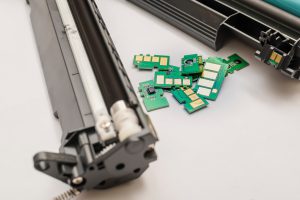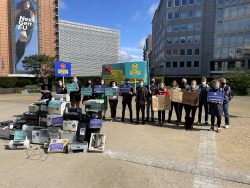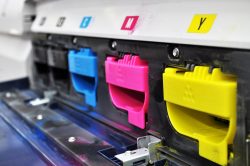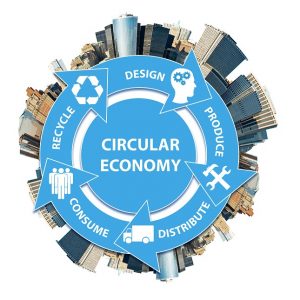ETIRA’s 2025 Vision: Tackling Non-Compliance and Championing Sustainability
January 13, 2025

As Europe’s office imaging market enters 2025, ETIRA calls for more vigorous enforcement and a unified push towards sustainable, compliant remanufacturing.
The European office imaging market faces a pivotal year in 2025, marked as a tipping point where rising economic pressures and tightening regulations reshape the industry. The European Toner and Inkjet Remanufacturers Association (ETIRA) is intensifying its efforts to tackle long-standing challenges and seize emerging opportunities for its members.
“2025 will test our industry’s resilience,” said Javier Martinez, ETIRA president. “But it’s also a chance to double down on compliance, sustainability, and fair competition.”
The Compliance Battle Intensifies
A top priority for ETIRA is addressing the ongoing influx of non-compliant imports. Despite years of advocacy, cartridges failing to meet EU standards—lacking CE markings, WEEE registration, or REACH compliance—continue to dominate market share, often entering through online platforms.
ETIRA highlights a growing EU-wide effort to hold online marketplaces accountable. An Online Sales Compliance team at the European Parliament is actively working to make platforms fully responsible for the products sold. ETIRA is engaging with this team to drive progress and align strategies.
“The unchecked flow of non-compliant imports undermines everything we’re working towards,” said Martinez. “2025 must be the year we see stronger enforcement and penalties across all EU member states.”
ETIRA urges greater collaboration among national authorities, industry stakeholders, and EU institutions like ECHA (REACH) and Market Surveillance Authorities (MSAs) to eliminate regulatory loopholes and penalize offenders.
Sustainability as a Growth Driver
With the EU’s circular economy agenda gaining momentum, 2025 represents a significant opportunity for compliant remanufacturers. ETIRA is championing remanufactured cartridges as cost-effective, environmentally responsible alternatives perfectly aligned with EU sustainability goals.
“The demand for sustainable solutions is growing, and remanufactured cartridges are ideally positioned to meet that demand,” said Martinez.
ETIRA strongly advocates for the inclusion of product criteria similar to those envisioned for Digital Product Passports (DPPs). These criteria would provide essential information about a product’s compliance, sustainability credentials, and remanufacturing history, empowering buyers to make informed choices.
Economic Challenges in 2025
The backdrop for ETIRA’s efforts is a challenging economic environment. Corporate bankruptcies surged in 2024, and the new year brings heightened inflation, rising energy costs, and interest rates.
These pressures are influencing office imaging sector trends. Businesses are increasingly opting for remanufactured cartridges as value-driven alternatives while delaying investments in new printers, relying instead on existing equipment.
“This environment reinforces the need for high-quality, compliant remanufactured consumables,” said Martinez. “But it also underscores the importance of fair competition—non-compliant products hurt both the environment and the economy.”
Looking Forward: ETIRA’s 2025 Agenda
ETIRA’s roadmap for 2025 includes:
- Advocacy for Fair Competition: Collaborating with EU institutions to strengthen enforcement against non-compliant imports and create a level playing field.
- Promoting Sustainability: Raising awareness about the benefits of remanufactured cartridges in achieving EU circular economy targets.
- Digital Product Passport-Type Information: Championing DPP-like product information to enhance market transparency and reward compliant businesses.
- Supporting Members: Providing resources and advocacy to help remanufacturers navigate economic and regulatory challenges.
A Vision for the Future
As Europe’s office imaging market adapts to the complexities of 2025, ETIRA remains committed to protecting and promoting its members’ interests. The association aims to secure a stronger, more competitive future by prioritising compliance, sustainability, and collaboration.
“2025 is a year of action,” said Martinez. “If we work together, we can overcome challenges and ensure a thriving, sustainable remanufacturing industry.”
Tags
2025circular economy
Compliance
Chip swopping is an “environmental disaster” says ETIRA
December 14, 2021

The practice of removing the chip from an empty OEM cartridge to fit onto a cheap non-OEM newbuilt creates more unnecessary waste and use of natural resources, and may be unlawful says ETIRA, the body that represents the European remanufacturers of OEM toner and inkjet cartridges.
Tags
circular economyOEM cartridge
unchipped cartridges
ETIRA supports ‘right to repair’ protest
May 28, 2021

A protest which took place on the streets of Brussels this week has been praised by ETIRA for raising awareness of the right to repair.
The demonstration, organized by the European Right to Repair campaign, saw protesters pile end-of-life printers in front of the European Commission while MEPs and members of the media watched on.
The event aimed to raise awareness ‘about the Commission’s continued inaction on this iconic destined to fail product [printers]…”
The European Right to Repair campaign said: “The European Commission’s flagship Circular Economy Action Plan, adopted in March 2020, has set out to address the entire life cycle of products and tackle their premature obsolescence notably by promoting the right to repair for ICT products.
“The Commission had rightfully identified printers as a particularly wasteful product, and committed to tackle them by means of a dedicated regulatory instrument “unless the sector reaches an ambitious voluntary agreement” by September 2020.”
Commenting on the fact that nearly one year later, the discussions on the voluntary agreement have not yielded any tangible results, the campaign team added: “We need strong regulatory action now.”
Chloé Mikolajczak, campaigner for the Right to Repair campaign, added: “Printers are one of the most iconic examples of premature obsolescence and some of the least repairable products brought to community repair events. According to data from the Open Repair Alliance, only 37% of printers get repaired at events, while 33% are deemed end of life.”
Javier Martinez, President of ETIRA said: “ETIRA supports the call for a Right to Repair. Remanufacturing printer cartridges and printers is textbook reuse and could create thousands of new jobs here in Europe. It should be the no. 1 item in Europe’s Green Deal and Sustainable Product policies.”
Tags
circular economyReuse
ETIRA calls for amendments to latest draft of the EU Voluntary Agreement for Imaging Equipment
October 29, 2020

The European Toner and Inkjet Remanufacturers Association (ETIRA) has issued a detailed response calling for amends to be made to the latest draft of the Voluntary Agreement for Imaging Equipment, released by Eurovaprint earlier this month.
The association, which represents inkjet and toner cartridge remanufacturers across the EU, says it acknowledges the proposal is a ‘useful step forward’ but urges amendments to be made, outlining its suggested minimum changes.

The aim of the draft Voluntary Agreement (VA) is to improve the environmental performance of imaging equipment products across the EU, through the creation of eco-design minimum requirements, supporting the EU’s Circular Economy Action Plan.
Javier Martinez, president of ETIRA, said: “ETIRA has always called for mandatory legislation to replace the Voluntary Agreement. In our view, only a mandatory approach can bring tangible and enforceable implementation of the goals defined under the Circular Economy Action Plan, because only a regulation is applicable to all market players.
“Legislation therefore continues to be our preferred option. However, ETIRA acknowledges that the October 2020 draft VA represents a useful step forward and, if the core objectives we continue to lobby for can be achieved through a more stringent voluntary agreement, ETIRA would be interested to participate and engage in the process, provided the proposal includes our suggested minimum amendments in line with EU Treaty, EU Circular Economy Action Plan and EU Eco-design directive.”
ETIRA’s suggested minimum amendments are:
- The exemptions in Articles 9.2.1, 9.4. and 9.5.2 should all be removed. Excluding cartridges under contract or subscription means that a very large part of the cartridge market is excluded from the VA, resulting in less cartridge reuse in the EU;
- A clear and ambitious re-use target for all cartridges marketed by the Original Equipment Manufacturers (OEMs) must be set: 45% within two years and 60% within four years. Without fixed targets, reuse of cartridges will not grow, in particular if contract or subscription sales are excluded;
- Transparency on the Bilateral Agreements (BAs): There is a need for equal terms. Equal volume pricing, equal technical solutions, equal product range etc. need to be offered by an OEM signatory to all supporting signatories who want to agree a BA with that OEM signatory;
- Criteria for qualifying as supporting signatory: ETIRA calls for a transparent and non-discriminatory decision-making process as to who can and who cannot become supporting signatory;
- The VA should be limited in time, e.g. maximum three-year period. During this period, the EU should prepare a regulation to replace the VA. ETIRA is happy to assist in this task;
- ETIRA asks that the VA recognizes ISO standards EN 45552 , EN 45553 to EN 45559 (resource efficiency) and also findings by the UNEP resource panel on “Value retention Processes
ETIRA will be sharing its feedback on the draft VA with all stakeholders, such as EU and Member State authorities, NGO’s etc,.
Tags
circular economyEU Voluntary Agreement
Reuse printer cartridges
ETIRA demands ‘fast action’ following EU’s Circular Economy report
August 5, 2020

The European Toner and Inkjet Remanufacturers Association (ETIRA) has issued an open letter to the EU, demanding ‘fast action’ to stop the ‘devastating impact’ the printing industry is having on the environment.

The letter, published on ETIRA’s website, responds to the EU’s Circular Economy report, stating that at present, consumers and small business owners are currently tied to buy expensive, environmentally damaging ink cartridge replacements from the Original Equipment Manufacturer (OEM), rather than being given the choice to reuse them time and again.
ETIRA is calling on the European Commission to end this cycle, banning chips and firmware updates, introducing a minimum number for reuse cartridges, and by stopping the import of cheap and polluting single-use cartridges from outside the EU.

Javier Martinez, president of ETIRA, said: “We need fast action to stop consumers and smaller business owners being held hostage by the big OEM’s.”
“A change in legislation would give consumers the freedom to choose the type of ink cartridges they purchase, putting environmentally friendly reuse cartridges on the table.”.
“It is hard to believe, but today you need 26 cartridges to print 10,000 pages vs just one cartridge 20 years ago!
“With green issues so high on the agenda across Europe we need to see legislation to help us in the printing industry work to reduce, remake and recycle – creating a circular economy in printing, in line with the EU’s Circular Economy Action Plan.”
The current printing business model has a devastating impact on the environment, creating huge waste due to the short life of the printing hardware, combined with single-use cartridges:
- Cartridges create 2.5% of total small and medium electronic appliances waste
- Both the Small Office (SOHO) and home printer repair rate is zero
- The average operating time for home printer usage is only five hours during its expected four years of operational life.
- The average total cartridge operating time is just 19 minutes
Javier Martinez added: “Sadly, buying a new machine is often cheaper than buying a new set of cartridges, meaning people throw away both the device and reusable cartridges. This has to stop.”
“We support the EU’s 2020 proposal for a Circular Economy. However, its current suggestion for a Voluntary Agreement for the printing sector can only be a real solution if it stops anti-cartridge reuse elements such as chips and firmware updates, creates a minimum number for reuse cartridges, and stops the invasion of cheap and polluting single use non-OEM cartridges from outside the EU. “
Martinez added: “We hope our open letter, agreed by all our members across the EU is effective in communicating this message and raising awareness of the urgent need for change”.
ETIRA believes there is a real opportunity for change. New legislation in this industry would see environmental improvements and generate up to 25,000 new jobs across Europe.
“There is so much good to be gained from changes to this sector and we want to see this pushed up the agenda and discussed,” concluded Mr. Martinez,
To read ETIRA’s open letter to the European Commission, click here
Tags
circular economyEU Circular Economy plan
printer cartridge reuse
An open letter to the European Commission, in response to the EU’s Circular Economy Report
July 31, 2020

When you buy a car, you are not told you can only fill it up at a certain petrol station – but when you buy a printer your hands are tied to the costly ink cartridge replacements sold by the manufacturer of the printer. This needs to change.
We are writing as the European Toner and Inkjet Remanufacturers Association (ETIRA), a non-profit organisation, representing the interests of the inkjet and toner cartridge remanufacturers.
In response to the welcome publication of the EU’s Circular Economy plan, we are calling for the EU to now take fast action against the way that printer manufacturers, who are for the most part based outside the EU, are holding consumers hostage to costly and environmental damaging replacements for their ink.
Our industry, a textbook example of Circular Economy, should be experiencing strong growth as we improve the European environment, provide savings for consumers, and create jobs. But the reality is that it is shrinking, and this is mainly due to the lack of a regulatory European framework facilitating cartridge reuse. The current EU approach, whereby printer manufacturers have only voluntary commitments to reduce the environmental impact of printing, (EU “Voluntary Agreement Imaging Equipment”, VAIE), has massively hindered cartridge reuse.
The current printing business model has a devastating impact on the environment, creating huge waste due to the short life of printing hardware combined with single-use cartridges mostly made from plastics. In addition to the single use cartridges from the printer manufacturers, there is an invasion of cheap non-OEM single use cartridges from Asia into Europe. Those cartridges may be a health and safety risk, because tests have shown that the chemicals and plastics used did not comply with minimum EU standards and are therefore not suitable for reuse or recycling.
According to the recent study commissioned by the EU (Task 1-7 assessment) on the deliverables of the last Voluntary Agreement:
- Cartridges create 2.5% of total small and medium electronic appliances’ waste
- Both the Small Office (SOHO) and home printer repair rate is zero
- The average operating time for home printer usage is only five hours during its expected four years’ life.
- The average total operational cartridge life is just 19 minutes
- Globally, the recovery thresholds for producers are far from being reached, and some OEM’s still incinerate 100 % (!) of what they recover
It is shocking to see that today you need 26 cartridges to print 10,000 pages vs. just one cartridge 20 years ago!
These increases in totally unnecessary plastic, metal, and other waste, in addition to the invasion of non-OEM single use plastic cartridges, must be stopped. Printer manufacturers should commit to implementing clear and measurable re-use objectives and targets. That is why we need an end to anti-cartridge reuse tactics such as chips and firmware updates that are blocking re-use cartridges, we need a minimum percentage reserved for reuse cartridges in the total number of cartridges placed on the EU market, and we need a full stop to the invasion of cheap and polluting single use non-OEM plastic cartridges from outside the EU.
ETIRA fears that it will be close to impossible for a Voluntary Agreement to achieve these objectives.
Especially in the current macro-economic situation, it is important to note that for printing, the remanufacturing industry does and will create jobs inside the EU: merely doubling the current rate of reuse would generate up to 16,000 – 20,000 additional jobs across the EU.
Now is the time for change. We need to see new legislation to reduce, promote preparation for re-use (e.g. remanufacturing) and raw material recycling – and thus create a circular economy in printing, in line with the Circular Economy Action Plan. The current original equipment manufacturer (OEM) printing business model is coercive to end users, wastes limited resources, and generates unnecessary waste. We want to see that changed.
Consumers should have freedom of choice, in line with the upcoming “right to repair and reuse” concept included in the EU’s Circular Economy Action Plan, instead of having their hands tied to one supplier. We know that the size of ink content and cartridges has decreased over time, while the price of printing is skyrocketing and that should not be allowed to continue.
We hear the stories of people buying a home printer, buying expensive ink cartridges and then finding that, when there is a problem with the printer, it is cheaper to just buy a new one that comes with new ink cartridges, rather than to repair the printer.
This has to stop. Our society cannot accept it. No other industry would accept this.

On behalf of all our members, businesses and consumers across Europe, we want to truly empower customer freedom of choice by facilitating true competition between OEM dealers and remanufacturers. Currently there is no freedom of choice and repair in the sector and no meaningful secondhand market.